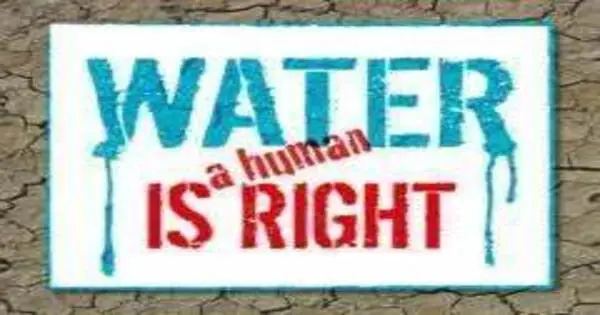The human right to water and sanitation (HRWS) is a principle that states that clean drinking water and sanitation are universal human rights due to their critical importance in sustaining everyone’s life. It is a fundamental principle that recognizes everyone’s right to safe, clean, accessible, and affordable drinking water and sanitation. On July 28, 2010, the United Nations General Assembly recognized it as a human right.
It is recognized as a part of international law and human rights standards, and its importance is highlighted by its inclusion in documents such as the Universal Declaration of Human Rights, the International Covenant on Economic, Social, and Cultural Rights, and the United Nations’ Sustainable Development Goals (SDGs).
Human rights treaties, declarations, and other standards have all recognized the HRWS in international law. Some commentators have used grounds other than the 2010 General Assembly resolution to argue for the existence of a universal human right to water, such as Article 11.1 of the International Covenant on Economic, Social, and Cultural Rights (ICESCR); among those commentators, those who accept the existence of international ius cogens and consider it to include the Covenant’s provisions hold that such a right is a universally binding principle of international law. The 1979 Convention on the Elimination of All Forms of Discrimination Against Women (CEDAW) and the 1989 Convention on the Rights of the Child (CRC) are two other treaties that explicitly recognize the HRWS.
The human right to water and sanitation encompasses several key principles:
- Availability: Everyone should have access to a sufficient quantity of water that is adequate for personal and domestic uses, such as drinking, cooking, cleaning, and sanitation.
- Quality: The water provided should meet certain quality standards, ensuring that it is safe and free from harmful contaminants that could pose health risks.
- Accessibility: Water and sanitation facilities should be physically accessible to all individuals, including those with disabilities or those living in remote areas.
- Affordability: Water and sanitation services should be affordable for all, and no one should be denied access due to their economic status.
- Non-discrimination: The right to water and sanitation should be accessible without discrimination of any kind, including factors such as race, gender, nationality, religion, or social status.
The United Nations Committee on Economic, Social, and Cultural Rights issued the clearest definition of the human right to water in General Comment 15 in 2002. It was a non-binding interpretation that access to water was a requirement for the enjoyment of the right to an adequate standard of living, inextricably linked to the right to the best possible health, and thus a human right. According to the document, “the human right to water entitles everyone to sufficient, safe, acceptable, physically accessible, and affordable water for personal and domestic uses.”
The inability to obtain safe drinking water and sanitation facilities can have serious consequences for public health, education, gender equality, and overall well-being. It disproportionately affects vulnerable populations, such as those living in poverty or marginalized communities. Efforts to ensure the realization of the human right to water and sanitation involve policy formulation, infrastructure development, resource allocation, and addressing social, economic, and cultural barriers.
















